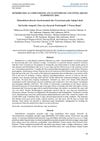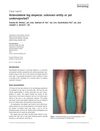 1 citations,
October 2018 in “InTech eBooks”
1 citations,
October 2018 in “InTech eBooks” The document concludes that treatments for cicatricial alopecia are not well-supported by evidence, but hair transplantation shows more predictable and satisfactory results.
 1 citations,
November 2015 in “Indian Journal of Clinical Biochemistry”
1 citations,
November 2015 in “Indian Journal of Clinical Biochemistry” The conference presented findings on how vitamin D levels, genetic factors, and lifestyle choices like smoking and yoga affect various health conditions and diseases.
 April 2024 in “The Egyptian Journal of Hospital Medicine ”
April 2024 in “The Egyptian Journal of Hospital Medicine ” Current treatments for androgenetic alopecia manage symptoms but don't cure it, and it affects social and psychological well-being.
 January 2024 in “Jurnal Ilmu Kesehatan Hewan”
January 2024 in “Jurnal Ilmu Kesehatan Hewan” Oreo the dog got better from skin and worm infections after treatment and cleaner living conditions.
 September 2023 in “Medical & Clinical Case Reports Journal”
September 2023 in “Medical & Clinical Case Reports Journal” Platelet-Rich Plasma (PRP) may increase hair density and thickness in Androgenetic Alopecia, but it's not significantly better than a placebo.
 January 2023 in “European endocrinology”
January 2023 in “European endocrinology” People with alopecia have a higher risk of thyroid cancer.
 September 2018 in “International Journal of Dermatology”
September 2018 in “International Journal of Dermatology” Anterolateral leg alopecia is a benign, nonprogressive hair loss condition on the lower legs that is not well understood and may resolve on its own.
 April 2021 in “Journal of The European Academy of Dermatology and Venereology”
April 2021 in “Journal of The European Academy of Dermatology and Venereology” Age, hair loss duration, menopause, and specific treatments affect hair density and caliber in female hair loss patients.
 February 2021 in “Dermatologic Therapy”
February 2021 in “Dermatologic Therapy” Injections improve hair growth, density, and thickness in women safely.
18 citations,
December 2015 in “PubMed” Intralesional triamcinolone is more effective than topical betamethasone for treating localized alopecia areata.
11 citations,
April 1997 in “International Journal of Dermatology” Using tretinoin with triamcinolone acetonide helps treat alopecia areata.
 August 2024 in “Archives of Dermatological Research”
August 2024 in “Archives of Dermatological Research” Low-dose oral minoxidil is effective and safe for treating androgenetic alopecia.
56 citations,
October 2016 in “Journal of dermatological science” New insights into the causes and treatments for the autoimmune hair loss condition Alopecia areata have been made.
23 citations,
October 2020 in “Anais brasileiros de dermatologia/Anais Brasileiros de Dermatologia” Tailored treatments for alopecia areata are recommended based on severity and patient needs.
 18 citations,
March 2022 in “Drug design, development and therapy”
18 citations,
March 2022 in “Drug design, development and therapy” Platelet-rich plasma (PRP) may help with various hair loss types, but more research is needed to find the best use method.
 6 citations,
May 2022 in “Frontiers in Microbiology”
6 citations,
May 2022 in “Frontiers in Microbiology” Marine microbes could be used in cosmetics for sun protection, skin care, and possibly preventing hair loss.
 6 citations,
April 2022 in “Biomedicine & pharmacotherapy”
6 citations,
April 2022 in “Biomedicine & pharmacotherapy” Using three different drugs together may better treat eye diseases like glaucoma and macular degeneration.
5 citations,
March 2022 in “Frontiers in Medicine” PRP is effective for treating hair loss, especially with other treatments.
5 citations,
January 2015 in “Saudi journal for health sciences” Alopecia areata in Taif is common, mainly immune-related, and best treated with topical corticosteroids and vitamins.
 4 citations,
June 2022 in “BioMed Research International”
4 citations,
June 2022 in “BioMed Research International” Using mesenchymal stem cells or their exosomes is safe for COVID-19 patients and helps improve lung healing and oxygen levels.
 3 citations,
June 2021 in “PLOS ONE”
3 citations,
June 2021 in “PLOS ONE” A topical BRAF inhibitor, vemurafenib, can speed up wound healing and promote hair growth, especially in diabetic patients.
 2 citations,
August 2023 in “Journal of Cutaneous Medicine and Surgery”
2 citations,
August 2023 in “Journal of Cutaneous Medicine and Surgery” PRP is effective and safe for increasing hair density in people with hair loss.
 1 citations,
December 2022 in “The journal of investigative dermatology/Journal of investigative dermatology”
1 citations,
December 2022 in “The journal of investigative dermatology/Journal of investigative dermatology” Choosing the right method to separate skin layers is key for good skin cell research.
1 citations,
August 2021 in “Arhivʺ vnutrennej mediciny” Hormonal imbalances can cause hair loss, and understanding them can help develop better treatments.
 October 2024 in “World Journal of Psychiatry”
October 2024 in “World Journal of Psychiatry” Stress worsens hair loss in androgenetic alopecia.
July 2024 in “Anais Brasileiros de Dermatologia” PRP injections can increase hair density in people with androgenic alopecia.
 June 2024 in “Stem cell research & therapy”
June 2024 in “Stem cell research & therapy” Regenerative medicine shows promise for treating skin disorders like hair loss and vitiligo.
 April 2024 in “Nigerian Postgraduate Medical Journal”
April 2024 in “Nigerian Postgraduate Medical Journal” Androgenetic alopecia is a common hair loss condition influenced by various factors and linked to psychosocial and cardiovascular issues.
January 2024 in “Diagnostics” Long COVID causes a wide range of long-lasting symptoms that change over time and are hard to diagnose and treat.
 June 2023 in “Journal of General Procedural Dermatology and Venereology Indonesia”
June 2023 in “Journal of General Procedural Dermatology and Venereology Indonesia” Older, overweight women with children and a family history of hair loss are more likely to experience female pattern hair loss.





















